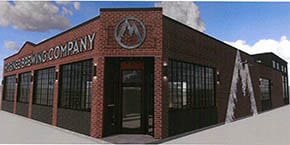
Building on a long history of beer brewing with big names like Miller and Pabst, Wisconsin is also a leader in the more recent trend toward craft beer consumption and microbreweries.

Rendering of Mosinee Brewing Company
The craft beer “movement” is a recent development, taking off across the U.S. at the beginning of the 2010s. According to the Brewers Association, a national trade association for craft beer-related businesses, Wisconsin had 160 craft breweries in 2017, up from 73 in 2011, and those breweries generated over $2 billion in total economic impact.
Because of the typically large capital investment required to start a microbrewery and the role these businesses can play as economic drivers in their communities, WEDC has supported several microbreweries through community development grants or tax credits.
“Microbreweries can offer numerous positive economic benefits to a community,” says Errin Welty, downtown development account manager for WEDC. “They contribute retail sales and activity, as well as manufacturing and distribution potential. By drawing more customers downtown during evening and weekend hours microbreweries also support additional retail and service growth, providing an appealing tourist destination.”
Examples of microbreweries that have received WEDC assistance include:
- Ooga Brewing Company, which received a $126,100 Community Development Investment (CDI) Grant to renovate and repurpose a former used car dealer and auto shop into the site of Beaver Dam’s first microbrewery;
- Earth Rider Brewery, which received a $109,877 CDI Grant to redevelop an old beer distribution warehouse complex in Superior into a craft brewery operation, the first brewery the city has had since 1967;
- Driftless Brewing Company, which received a $125,000 CDI Grant for a $1.1 million expansion project that allowed the brewery, located in the Village of Soldiers Grove, to increase its production from one to 15 barrels, as well as the addition of a 70-seat taproom;
- East Troy Brewery, which received a $250,000 CDI Grant to assist in the renovation and transformation of the former State Bank of East Troy into a new brewery that will feature an automated brewery system;
- Three Sheeps Brewing, which received $70,000 in tax credits for a facility expansion in Sheboygan and the addition of a 50 barrel system, increasing production capacity to over 100,000 barrels;
- Octopi Brewing, which received a $300,000 loan to fund the purchase of new canning machines and the expansion of its packaging facility in Waunakee, a project expected to create 13 new positions at the brewery;
- Vintage Brewing Company, which received a $250,000 CDI Grant to construct a new brewery and brewpub in the Village of Sauk City a project expected to create 90 new jobs; and
- Mosinee Brewing Company, which received a $250,000 CDI Grant to assist in the renovation of a vacant commercial building in downtown Mosinee into a taproom and brewery.
And it’s not just about beer consumption—the microbreweries can provide education about brewing techniques and can also serve as community gathering places, Welty notes.
“Increasingly, customers are looking for locally produced, artisan foods and unique destinations for a night out or a weekend getaway,” she says. “Microbreweries offer a more family-friendly and inclusive environment than traditional bars and can attract a more diverse audience to the downtown area.”






